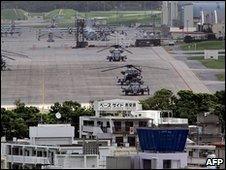Japan PM in deal to keep US base on Okinawa
- Published

The Futenma base is deeply unpopular with many Okinawans
Japan and the US say they have agreed to relocate a controversial American military base on the island of Okinawa.
The two sides issued a statement saying the Futenma base would be moved from its current urban location to a less crowded part of the Japanese island.
Japanese PM Yukio Hatoyama recently backed down on an election pledge to move the base off Okinawa altogether, angering many locals.
A coalition partner who refused to back the deal has lost her cabinet post.
Mizuho Fukushima, the gender equality minister and leader of the Social Democrats, said she could not "betray the Okinawans" by supporting the agreement.
Following a telephone conversation with US President Barack Obama, Mr Hatoyama told reporters the two countries had been able to come to an agreement, reaching his self-imposed deadline of the end of May.
In a joint statement, the US and Japan said they had "confirmed the intention to locate the replacement facility at the Camp Schwab Henoko-saki area and adjacent waters".
"The US-Japan alliance remains indispensable not only to the defence of Japan, but also to the peace, security and prosperity of the Asia-Pacific region."
In a reference to the rising tensions on the Korean peninsula, the statement added: "Recent developments in the security environment of north-east Asia reaffirmed the significance of the alliance."
The two countries said they recognised the concerns of Okinawans that they "bear a disproportionate burden related to the presence of US forces, and also recognised that the more equitable distribution of shared alliance responsibilities is essential for sustainable development of the alliance".
Poll threat
The joint statement is formal confirmation that Japan's prime minister has given up his attempts to move the US Marines' Futenma base away from Okinawa, or even out of the country.
The BBC's Roland Buerk in Tokyo says that operational objections from the US, as well as opposition from people living on other islands proposed as alternative locations, have forced the prime minister into a humiliating climbdown.
The new deal is similar to one reached in 2006 which Mr Hatoyama had vowed to tear up.
The sacking of Ms Fukushima, who had insisted that the Futenma base be moved entirely from Okinawa, is one of the domestic repercussions for him, says our correspondent.
She said she could not "be a part of an agreement that imposes a burden on Okinawans".
The perception among voters that the prime minister has mishandled the issue could cost him dearly in mid-term elections to the less powerful upper house of parliament, expected in July, our correspondent says.
Okinawa is home to more than half of the 47,000 American troops based in Japan.
Islanders have been angered by incidents involving US troops based there, including the 1995 rape of a 12-year-old Japanese girl and a helicopter crash in 2004.
Okinawa is the focal point of the security treaty between the US and Japan which has balanced military power in north-east Asia since World War II.
Under the pact, Japan - which is prevented from maintaining a war-ready army by its constitution - subsidises the US military presence while the US guarantees Japan's security.